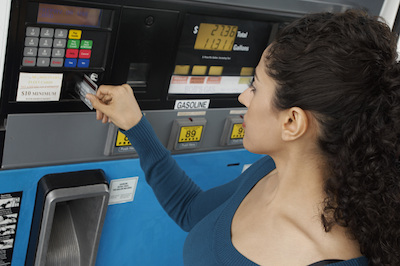Fuel Fleet Card vs. Credit Card

What are the differences between a fleet fuel card versus a credit card?
There are different benefits to each one. Choosing between them depends on what you’re after.
With a corporate card, you’ll have just one supplier and card, while with fleet fuel cards, you’ll have a level of transaction details not found with corporate cards, and more protection from theft by employees. To further curtail fraud, the fleet cards have built in point of sale control that you can adjust as you see necessary, or as your bottom line demands. Read on for more fleet fuel card benefits.
Trade-Offs
The corporate card won’t come with granular level 3 data about your fleet fuel spend.
This includes the data required for level 1 (C2C purchases), level 2 (B2B purchases), as well as information like item quantity and description.
So you’re not going to get the odometer number, the kind of fuel being pumped and its cost on the gallon or other carrier information. You’re not going to get miles per gallon or cost per mile, rather the fleet spend information is going to be part of the total expense on the corporate card.
When you use a corporate card, you’re getting one card, which means your drivers will have the convenience of using a single card for all of their expenses. If you’re less concerned about vigilance, you’ll also allow your drivers more freedom and the ability to get out of a jam if needed.
You’ll also receive purchasing control and rebates on all buys – not just on fuel. So it could pay to allow expenses on the company card if they’re controlled, because the higher amounts will reach higher return.
Kinds of Cards Fleet Fuel Cards
There are a variety of fleet cards that you can choose from.
These include:
- Branded cards that you’ll use from companies like Sunoco, Chevron or Shell.
- Universal cards from U.S. Bank Voyager, Wright Express and Comdata.
- Merchant cards that function similarly to universal cards, but are from places like QT and Circle K.
- Cardkey that only allow you to pump at select, private locations.
Fleet Fuel Card Pros
What are the pros of a fleet fuel card?
- Managing your accounts online
- Getting Level 3 information about your drivers’ pumping habits
- Receiving special promos, rebates and discounts aimed at fleets
- Working with one central billing location
- Safety from fraud
- Extra security in the form of cardkey (your driver will enter a special number at the point of sale)
- Using brand cards to get that brand’s discounts
- Total coverage, wherever you travel
Driver Ease
Both corporate cards and fleet cards are designed to be easy to use. Even the networks that are private among the fleet cards work in most locations. While they do not all provide universal coverage, they can work well when the outfit using them is small and covers a compressed area. However, when the geographic area is larger, getting a card that will grow with the boundary traversed becomes increasingly important. That’s the area served by universal fuel cards and corporate cards.
The importance of driver convenience when using cards on the road can’t be overstated – while fleet managers are talking about the added expense on their end, and desire for more control, drivers may be racking up many miles to reach a location where the assigned card will be accepted – costing companies even more.
